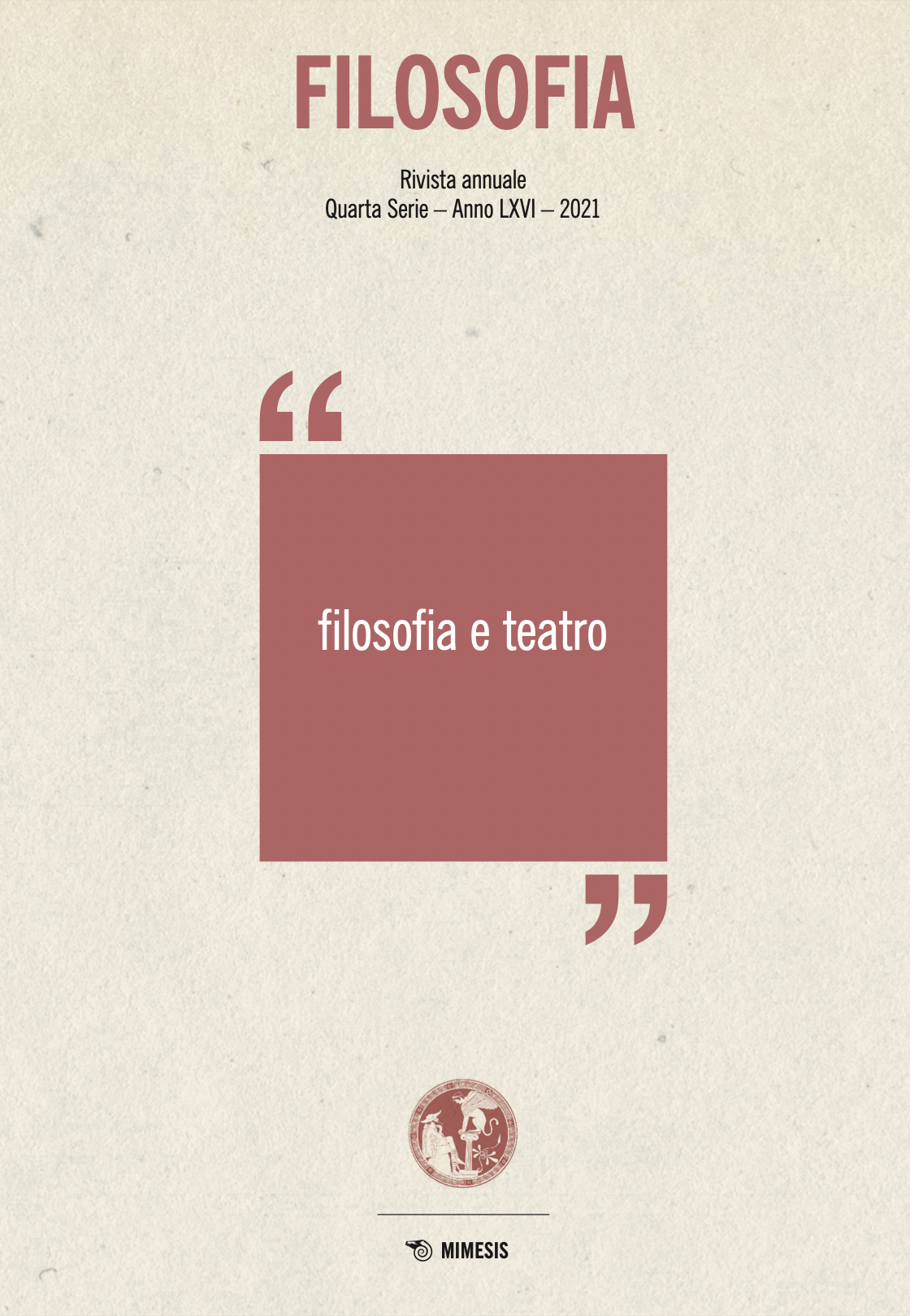La filosofia va in scena: il problema della teodicea nel teatro di Voltaire
DOI:
https://doi.org/10.13135/2704-8195/6289Keywords:
Sémiramis, tragedy, Lisbon, theodicy, justiceAbstract
The article aims to analyse Voltaire’s reflection about theodicy in his production, both theatrical and theoretical. The focus is to point out the link between these two parts of his writings. Indeed, although Voltaire is now known as philosopher and writer, at his time he was considered in primis as a dramatist. In his pièces Voltaire inserts many of his philosophical ideas. In particular, Voltaire’s tragedy Sémiramis (1748) will be considered in order to understand how the author deals with the problem of divine justice in his theatre. The problem of theodicy is present in Voltaire’s thinking years before the disaster of Lisbon earthquake of 1755, and Sémiramis highlights this aspect. The evolution of Voltaire’s consideration about the presence of evil is an important part of his philosophical production. In Sémiramis he anticipates some of the considerations presented in the Poème sur le désastre de Lisbonne (1756) and he offers an original solution to this problem.
Downloads
References
Baczko, Bronisław. 1999. Giobbe amico mio. Promesse di felicità e fatalità del male. Tr. it. Paolo Virno. Roma: Manifestolibri.
Bianchi, Lorenzo. 2019. Destino, fato e libertà. Voltaire e il terremoto di Lisbona del 1775 in Destino e libero arbitrio, Bianchi, Lorenzo, e Antonella Sannino, a cura di, 181-202. Napoli: Bibliopolis.
Bjurström, Per. 1956. “Mises en scène de Sémiramis de Voltaire en 1748 et 1759”. Revue de la société d’Histoire du Théâtre 8, n. 4: 299-320.
Carassai, Marco, e Simone Guidi, a cura di. 2016. Filosofia e catastrofe. Lo Sguardo – Rivista di filosofia, n. 21, II.
Carobene, Germana. 2000. Tolleranza e libertà religiosa nel pensiero di Voltaire. Torino: Giappichelli.
Cassirer, Ernst. 1956. Il problema Gian Giacomo Rousseau. Tr. it. Maria Albanese. Firenze: La Nuova Italia.
Costazza, Alessandro. 2010. La filosofia a teatro. Milano: Cisalpino.
Fazio, Mara. 2003. “L’ombra di Shakespeare nella Sémiramis di Voltaire”. Il castello di Elsinore 46: 5-26.
Fontaine, Léon. (1878) 1967. Le théâtre et la philosophie au XVIII siècle. Genève: Slatkine Reprints.
Gaiffe, Félix. 1910. Le drame en France au XVIIIe siècle. Paris: Colin.
Gatti, Roberto. 1997. L’enigma del male. Un’interpretazione di Rousseau. Roma: Studium.
Heller, Ágnes. 2020. Tragedia e filosofia. Una storia parallela. Tr. it Andrea Vestrucci. Roma: Castelvecchi.
Hersant, Marc, Fabrice Moulin, et Guo Tang. 2019. “Dossier Voltaire et le sang innocent”. Cahiers Voltaire 18: 7-48.
Jacobs, Eva. 1985. Tragedy and Didacticism. The case of Voltaire in Voltaire and his World: Studies presented to W.H. Barber, Howell Robin J., a cura di, 51-65. Oxford: Voltaire Foundation.
Lattanzio, Cecilio Firmiano. 2011. La collera di Dio. Tr. it. Luca Gasparri. Milano: Bompiani.
Luciani, Paola. 1999. Per la fortuna delle tragedie di Voltaire. Il “Maometto” in Le passioni e gli affetti. Studi sul teatro tragico del Settecento, Luciani Paola, a cura di, 141-156. Pisa: Pacini Editore.
Mall, Laurence. 2008. ‘Dieu est juste; il veut que je souffre; et il sait que je suis innocent’: le problème du mal dans les Rêveries de Rousseau in The Nature of Rousseau’s Rêveries: Physical, Human, Aesthetic, O’Neal John C., edited by, 153-64. Oxford: Voltaire Foundation.
Menin, Marco. 2020. “Il deismo materialista di Voltaire”. Micromega, n. 8: 193-199.
Neher, André. 1983. L’esilio della parola. Dal silenzio biblico al silenzio di Auschwitz. Tr. it. Giuseppe Cestari. Casale Monferrato: Marietti.
Neuhouser, Frederick. 2008. Rousseau’s Theodicy of Self-Love: Evil, Rationality, and the Drive for Recognition. Oxford: Oxford University Press.
Peyronnet, Pierre. 1978. “Voltaire “metteur en scène” de ses propres œuvres”. Revue de la Société d’Histoire du Théâtre 30, n. 1: 38-54.
Pomeau, René. 1956. La religion de Voltaire. Paris: Nizet.
Quintili, Paolo. 2021. Filosofie a teatro. Studi di messa in scena filosofica delle idee. Milano: Biblion Edizioni.
Ridgway, Ronald S. 1961. La propagande philosophique dans les tragédies de Voltaire. Genève: Institut e Musée Voltaire Les Delices.
Rousseau, Jean-Jacques. 2004. Lettera a Voltaire sul disastro di Lisbona (18 agosto 1756) in Voltaire, Rousseau, Kant, Sulla catastrofe. L’illuminismo e la filosofia del disastro, Tagliapietra Andrea, cura di. Tr. it. Silvia Manzoni, e Elisa Tetamo, 23-48. Milano: Mondadori.
Sicco, Debora. 2018. «Je haїs le fanatique et le pérsecuteur»: la promozione della tolleranza nel teatro di Voltaire, in Il Settecento e la religione, Delpiano Patrizia, Formica Marina, Rao Anna M., a cura di, 171-183. Roma: Edizioni di storia e letteratura.
Stenger, Gerhardt. 2011. Le Dieu de Voltaire in OCV, vol. LXXII, XXIII-XXXVIII. Oxford: Voltaire Foundation.
Stenger, Gerhardt. 2013. Introduction a Voltaire. De l’âme (1775), in OCV, vol. LXXVI, 209-237. Oxford: Voltaire Foundation.
Tagliapietra, Andrea. 2004. Introduzione a Voltaire, Rousseau, Kant. Sulla catastrofe. L’illuminismo e la filosofia del disastro, Tagliapietra Andrea, a cura di. Tr. it. Silvia Manzoni, e Elisa Tetamo. IX-XXXIX. Milano: Mondadori.
Voltaire. 1877-1883. Œuvres complètes de Voltaire (OCM). Moland, Louis, a cura di. Paris: Garnier.
Voltaire. 1968-1977. Correspondence and related Documents. Besterman, Theodore, a cura di. Oxford: Voltaire Foundation.
Voltaire. 1968 – in corso di pubblicazione. Œuvres complètes de Voltaire (OCV). Oxford: Voltaire Foundation.
Voltaire. (1763) 1995. Trattato sulla tolleranza. Tr. it. Lorenzo Bianchi. Milano: Feltrinelli.
Voltaire. (1756) 2004. Poema sul disastro di Lisbona in Voltaire, Rousseau, Kant. Sulla catastrofe. L’illuminismo e la filosofia del disastro, Tagliapietra Andrea, a cura di. Tr. it. Silvia Manzoni, e Elisa Tetamo, 1-22. Milano: Mondadori.
Voltaire. (1764) 2013. Dizionario filosofico. Tr. it. Domenico Felice, e Riccardo Campi. Milano: Bompiani.
Voltaire. (1734) 2016. Lettere filosofiche. Tr. it. Riccardo Campi. Milano: Rusconi.
Voltaire. (1775) 2020. Sull’anima. Tr. it. Marco Menin. Micromega 8: 199-213.



